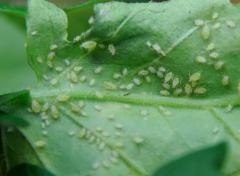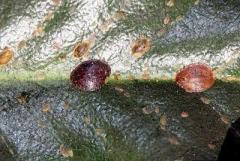by Vancouver Island Master Gardeners Association
Question: What is the sticky honeydew on my houseplants?
Answer: If your plants appear shiny, wet and sticky you are observing honeydew. This is evidence of aphids or scale.
Both aphids and scale are small insects with sucking mouthparts which they use to extract nutrient-rich liquid from plants. The excess sap is excreted as honeydew, which falls on to the leaves. As it builds up, this can lead to a black-colored fungus, which inhibits photosynthesis and deprives the plant of energy.
If you see honeydew, isolate the plant so that others in your house don’t get infested and start treatment:
Aphids:
Aphids, shown on a house plant. Source: Gardeners World.
Aphids enter the home through open windows and doors, on cut flowers or on newly purchased house plants. They are often green, but can be black, yellow, brown, etc. If you look closely, you will be able to see them, usually clinging to the stem and on the leaves.
If you see aphids, you need to get started on resolving the problem. They can reproduce parthenogenetically (without mating) and a few aphids can quickly become an infestation.
To address an aphid infestation, you should isolate the infested plant from any others in the house to avoid spread. Then you can do any of the following:
- Squish aphids with a gloved hand.
- Direct a spray or jet of water at the plant which will break their sucking mouthparts leaving them unable to feed (use care with this method so as not to damage the plant)
- Cover all surfaces of the plant, including underside of leaves, with an insecticidal soap, such as Safer’s soap, which will dehydrate the aphid body and kill it.
- If the plant is not completely infested, rubbing alcohol can be used as a spot treatment. Apply a dab of alcohol directly to the aphids you can see with a cotton bud. Allow the alcohol to dry on the pests for about five hours. Rinse the alcohol from the plant.
Soft Scale:
Scale on indoor house plants often appears as a small, brown, rounded lump. Photo: Whitney Cranshaw, Colorado State University, Bugwood.org.
Soft scale is another frequent cause of honeydew. These insects vary in color, shape and size, but most often appear as small, brown rounded lumps. They are most often found on a plant’s leaves (including the underside) and stems, or along the leaf mid-veins.
To address a scale infestation do any of the following:
- Pick off or gently scrub the scale loose from the leaves and stems OR dab each scale with an alcohol-soaked cotton swab. Repeat every 7-10 days until you see no scale.
- Use double-sided sticky tape on the plant’s branches. Scale cannot fly so dispersal depends on the movement of crawlers, so this will capture them at this stage.
- Treat with an insecticidal soap or horticultural oil labeled for indoor plants or a houseplant spray that is registered for use on indoor plants.
- For heavy infestations, it may be best to discard the plant.
For gardening questions in the growing season, contact the Gardening Advice Line.



